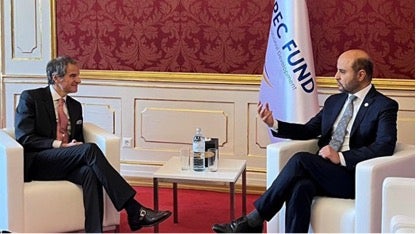
IAEA Director General Rafael Mariano Grossi and President of the OPEC Fund for International Development (OPEC Fund) Abdulhamid Alkhalifa have signed a Practical Arrangement (PA) to strengthen collaboration on health, agriculture, energy and climate adaptation. The PA will focus on the key IAEA initiatives to improve cancer care through Rays of Hope: Cancer Care for All; use nuclear science to boost agriculture through Atoms4Food; and to cooperate in areas related to water scarcity, environmental monitoring and energy planning.
Speaking at the OPEC Fund Development Forum, Grossi highlighted the need for action to combat the growing global cancer burden. It is estimated that by 2030, 70% of cancer deaths will occur in lower- and middle-income countries. However, at present, these countries only represent 5% of global spending in this area. “Around 80% of the African population does not have access to radiotherapy at all,” he noted.
“I invite you to see the IAEA in this ecosystem of financial institutions and technical institutions, as your technical instrument,” he told the OPEC Fund audience. “What we are doing is providing the science behind all of these projects. We are the ones developing the methodologies, we are the ones training the technicians … the medical oncologists, the radiotherapists, in different parts of the world… It’s a huge area where the IAEA is bringing its expertise to work together in a very effective way. Thanks to this partnership with the OPEC fund, we hope to be working in a scope commensurate with the dramatic needs we are facing.”
Together with the OPEC Fund, the IAEA is finalising a plan to support around a dozen countries in Africa, Asia and the Pacific, Europe and in Latin America and the Caribbean regions. These countries will be provided with capacity to sustainably improve their medical health infrastructure under the Rays of Hope initiative.
The OPEC Fund, in collaboration with the IAEA, has significantly supported Malawi in starting construction work on radiotherapy and brachytherapy bunkers, work expected to be completed by the end of June 2024. This project also includes the delivery of cancer care equipment and ongoing training of medical professionals under the IAEA Rays of Hope initiative.
On food safety and water scarcity Grossi noted: “With nuclear techniques you can develop crops which are drought resistant, that are resistant to pesticides, that require less fertiliser … through isotope hydrology, which is a nuclear technique, we can determine the soil fertility and the amount of water we might need.” He added: “We are so happy to be partnering with the OPEC Fund because the development needs are so huge. This is why we decide to work together.”






